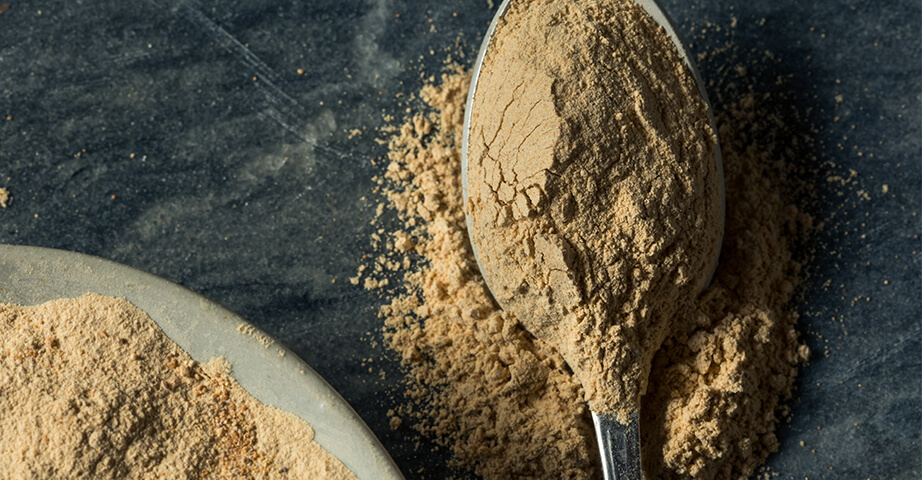Maca - Peruvian adaptogen and superfood combined

Maca is a plant known to Peruvians for thousands of years because it grows naturally in the Andes. The edible part is the maca root, which looks like a radish. Traditionally, maca has been a dietary and medicinal ingredient. What does modern science say about its properties? Maca indeed has great health-promoting potential. It is a great source of minerals, some vitamins, antioxidants and essential amino acids. There is more and more evidence concerning the effectiveness of maca as an adaptogen affecting the nervous system, as well as a substance beneficial to sexual health. Who might benefit from maca? In what doses should it be taken and how should it be incorporated into the diet?
What is maca?
Maca (Lepidium meyenii) or Peruvian Pepper is a cruciferous vegetable (like broccoli, cabbage, cauliflower) originating from the Andes region of Peru. Maca grows in very specific conditions - at high altitudes, strong sunlight and wind with large temperature differences. The Maca looks similar to a radish. It has round bulbous roots and green leaves above the ground. The colour ranges from yellow through pink, red and purple to black. In the Andes, maca has been a dietary component commonly eaten for thousands of years. The edible parts and those used as a health food are its root and the hypocotyl, the lowest part of the stem. Maca has an aroma similar to toffee and a spicy flavour that many people find unacceptable. The raw vegetable is believed to be harmful, so in Peru, maca is consumed after being dried then soaked and cooked, roasted or in the form of the fermented drink 'maca chicha'.
Maca is attributed with numerous health-promoting properties. It is primarily known as an adaptogen. According to the definition, adaptogens are a pharmacological group of herbal preparations that increase tolerance to mental exhaustion, improve concentration, attention and mental stamina in situations of reduced performance. Traditional medicine claims that maca has a positive effect on fertility and libido in both men and women. Different types of maca have slightly varying health effects, but this is a subject that is still being explored by science.
Recommended products with maca root
Maca - active ingredients
Maca has a very high nutritional density. In a small quantity, it provides a concentrated amount of valuable ingredients for health. This is why it is classified as a superfood. Maca is a source of dietary fibre (8.5 g/100 g of dry matter) and essential amino acids, which must be supplied with food because the body does not produce them itself. What is important, maca is rich in aspartic acid (91.7 mg/100 g d.m.) and glutamic acid (156.5 mg/100 g d.m.) - amino acids essential for the functioning of the nervous system. Maca root is also characterized by a high content of mineral components. In 100 g of dry matter, there is 150 mg of calcium, 16.6 mg of iron, 18.7 mg of sodium, 5.9 mg of copper and 3.8 mg of zinc. Maca is rich in antioxidants. It can be a valuable dietary supplement to reduce chronic inflammation in the body and help prevent cancer. Numerous active components are responsible for the health-promoting action of maca:
- antioxidants - flavonoids and anthocyanins,
- tannins,
- saponins,
- prostaglandins,
- alkaloids,
- sterols - β-sitosterol, campesterol, stygmasterol,
- unsaturated fatty acid amides - macaenes (0.09-0.45% of dry weight) and macamides (0.06-0.52% of dry weight),
- glucosylates.
Maca - health-promoting properties
Scientific research regarding the health-promoting properties of maca is still at an early stage and it cannot be said for sure that maca has specific beneficial health effects in any aspect. Some of the properties and traditional uses of maca seem to be confirmed by modern science, although more research with human subjects is still needed. What is currently known about the health properties of maca?
Maca and sexual function
The improvement of sexual function is one of the main traditional uses of maca. It is even called Peruvian ginseng in reference to these ginseng properties. What effect does it have on libido?
According to a study, maca taken twice a day for 12 weeks at a dose of 1.5-3 g can improve sexual function and increase libido in people taking antidepressants. The same dosage was found to increase libido among healthy male test subjects after 8 weeks of intake. Maca may also have beneficial effects on mild erectile dysfunction. In one of the analyses, men were administered 2.4 g of maca root powder per day for 12 weeks and noticed a stronger effect on erections than after placebo treatment.
It has been proven that supplementation can directly positively affect libido without modifying testosterone or estradiol levels.

Maca and fertility
Animal studies clearly show that maca can improve sperm quality - increase the number of sperm in the vas deferens, as well as increase the amount and motility of sperm. Studies conducted with men show the same results, however, current analyses were based on small groups of participants, so it cannot be clearly stated that maca has properties improving male fertility. It has also been found to have a positive effect on female fertility in rats. Supplementation with maca root was reported to increase pituitary gland hormones during the follicular phase - LH and FSH, which are associated with the ability to become pregnant. This outcome promotes ovulation by improving the function of the pituitary gland-gonadal axis.
Maca during the menopause
Maca supports the optimal functioning of the hypothalamus and pituitary gland, improving the work of all endocrine glands. Among women in menopause, the effects of maca supplementation have been reported on hormonal balance - FSH, oestradiol and progesterone, as well as limiting weight gain, lowering plasma triglyceride levels and increasing phosphorus and calcium deposition in bone and muscle tissues. It is also well established that maca may contribute to increased estrogen secretion, reducing menopausal discomfort. Maca appears to have a positive effect on depression, also acting as a sedative by lowering cortisol levels. An important property of maca for menopausal women is its positive effect on increasing bone density and preventing osteoporosis, to which women are most vulnerable. Consumption of maca makes increasing the weight of the femur and the lumbar spine possible.
Scientific research reports that administering maca root to menopausal women can reduce both physiological and emotional symptoms resulting from menopausal hormonal changes.
Effect of maca on the nervous system, mood and stress
Maca is classified as an adaptogen, a plant with properties regulating the balance of the human nervous system. Just like other adaptogens, maca probably affects the hypothalamic-pituitary-adrenal axis and influences the secretion of stress mediators. It is also believed that maca may help prevent variations in blood sugar levels as well as support the health of the adrenals, which regulate mood and energy throughout the day. The adaptogenic properties of maca manifest as increased resistance to stress, physical and mental performance as well as reduced anxiety. Early studies with humans also indicate that maca may improve mood in people with depression. Meanwhile, a study in mice exposed to chronic mild stress showed that maca extract demonstrated antidepressant effects that involved activation of both the noradrenergic and dopaminergic systems.
In vitro and in vivo studies from recent years confirm the neuroprotective properties of maca. It means that maca can have a positive effect on memory, focus or learning abilities.
Maca may prove to be an effective agent with a positive impact on mood, memory and stress management. However, there is not enough evidence to confirm that maca has such effects.

Maca powder - maca supplements
Maca is available in Poland as a dietary supplement in the form of maca root powder, capsules containing powdered maca root or maca extract, as well as a maca root liquid extract. Depending on the form, the content of active substances in the preparation may vary, so the effect will be different. Supplements with a defined amount of maca root extract are more reliable than maca powder without any standardization because it is known exactly how much active substance is in the product. The maca root itself can have very different concentrations of active compounds, which is caused by, for example, the conditions of cultivation, storage and preparation of the powder.
Where to buy maca powder? It is available in shops selling so-called health food, BIO food, organic food and herbs. Maca powder, like other maca supplements, can also be bought in pharmacies or on manufacturers' websites. BIO Maca is available to purchase in shops and online. Maca powder is usually yellow, red or black but the colour may vary. It is due to the variety of maca species.
How to include maca root in your diet? Because of the unpleasant flavour, maca powder combines well with oatmeal and crunchy foods. It can be easily added to fruit and protein shakes or mixed with fruit or vegetable juice. Yellow coloured maca has a much milder flavour than purple and blac
Maca powder taken orally at a dose of up to 3 g per day is considered to be safe and has no side effects.

